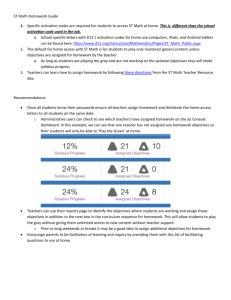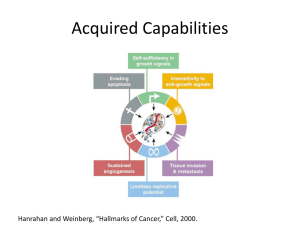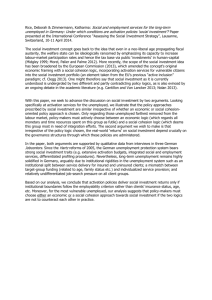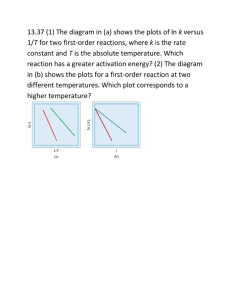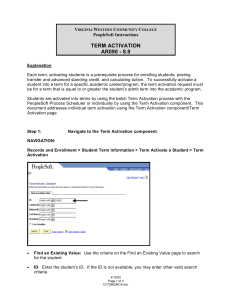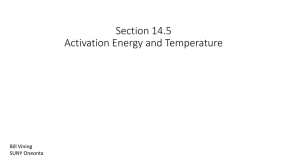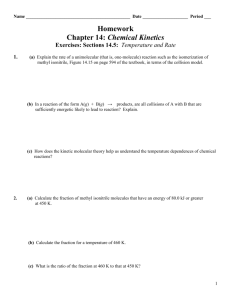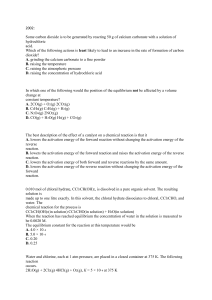Errors and Cognitive Processes
advertisement
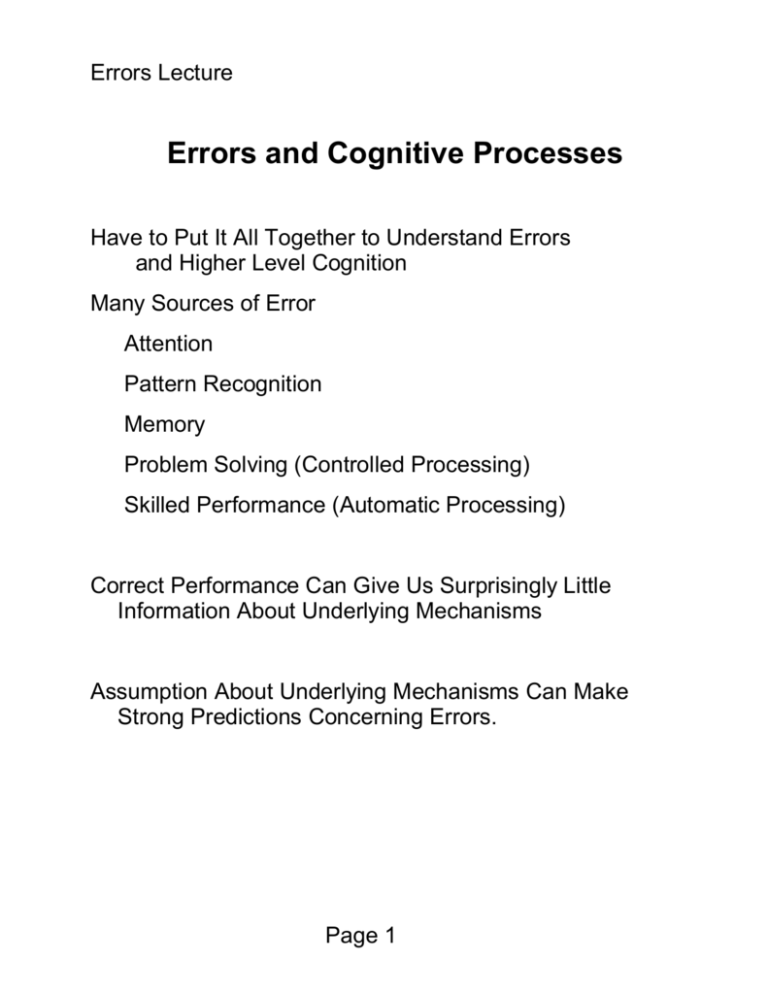
Errors Lecture Errors and Cognitive Processes Have to Put It All Together to Understand Errors and Higher Level Cognition Many Sources of Error Attention Pattern Recognition Memory Problem Solving (Controlled Processing) Skilled Performance (Automatic Processing) Correct Performance Can Give Us Surprisingly Little Information About Underlying Mechanisms Assumption About Underlying Mechanisms Can Make Strong Predictions Concerning Errors. Page 1 Errors Lecture Definitions of Errors (From Kieras Lectures on Error) Basic concept An intention or plan is formed Actions to accomplish the intention are executed Errors are Intentional but Incorrect Actions Errors of Commission Errors of Omission Slip Actions were not executed correctly Plan to push the stop button, hit the start button instead. Mistakes The wrong intention or plan was constructed Could be correctly executed Page 2 Errors Lecture Errors and Operation of Complex Systems (Kieras) Errors made immediately by operators of a system Latent errors Errors made by designers, decision makers, construction & maintenance workers, etc. Don't necessarily have an effect until some special circumstances "accident waiting to happen" Page 3 Errors Lecture Errors and Complex Systems (Cont.) Violations Deliberate deviations from socially defined practice Routine violations • Make task easier • No enforcement in place • E.g. cutting across grass Exceptional violations • Result from combinations of social & organizational forces • Can result in suppression of warnings, major management errors E.g. Chernobyl accident • Reactor deliberately operated against the rules, at a power level known to be unsafe, supervised by unqualified Page 4 Errors Lecture Errors As Data On Cognitive Processes Assumption About Underlying Mechanisms Can Make Strong Predictions Concerning Errors. Recall Errors From STM Errors in Multicolumn Subtraction Typing Errors Accident Investigations Methods for Studying Human Error (From Kieras) Error behavior is hard to study Error events are hard to capture In laboratory studies Many different ways to make an error Erroneous behavior normally not analyzed Errors often have low frequency Page 5 Errors Lecture Studying Errors (Cont) Major sources of information on errors Detailed analysis of accidents • Note that errors could have happened a long time before Diary studies • People write down errors soon after they happen Classifying Errors Classification is difficult; needs a better theoretical model than currently available Page 6 Errors Lecture More On Slips and Mistakes Two Major Kinds of Errors Slips Mistakes Slips Correct Goal or Intention Have Necessary Knowledge and Skills Familiar Situations Wrong Action Sequence Show Up In Skilled, Highly Automated Behavior Mistakes Incorrect Goal or Intention Lack of Necessary Skills or Knowledge Novel Situations Problem Solving Behavior Controlled Processing Page 7 Errors Lecture Procedural Knowledge, Goals, and Activation Execution of Procedural Knowledge is Controlled by ACTIVE Goals A Set of Rules that Performs a Task Has a Common Controlling, ACTIVE GOAL A Schema that Performs a Task Has a Common Controlling, ACTIVE GOAL Schacter and Errors The Sin of Absentmindedness Error of Omission Failure to Successfully Activate Goal Associated with ToBe Performed Action Page 8 Errors Lecture Activation-Trigger-Schema (ATS) Norman (1981, 1988) Activation • Priming (Preparation) verses Execution • Triggered Schema With Most Active Goal Controls Behavior • Loss of Activation of Goal Causes Schema to Lose Control Trigger(s) • Like Conditions of Rules • Trigger Execution of Primed Schema • Context Cues Provide Triggering Information Schemas • Complex Skills Like Driving Home • Hierarchies of Goals and Subgoals • Actions That Accomplish Goals and Subgoals • Role of Triggers and Activation In Schema Execution Schema Collect of Rules to Performs a Task Sequence of Actions that Performs A Task Page 9 Errors Lecture Slips in the ATS Model Errors In Formation Of Goals Or Understanding Context Faulty Activation Of Schemas Faulty Triggering Of Active Schemas Page 10 Errors Lecture Slips That Result From Errors In Formation Of Goals Or Understanding Context Description Errors Ambiguous or incomplete description of the goal and/or situation Perform Correct Action on Wrong Object Examples "Come in" to phone... Use phone hand set to continue dictating Throwing Dirty Shirt in ... Pour Orange Juice in ... Mode Errors Erroneous classification of the situation Examples Text editors Multifunction controls Serious problem in high automated systems Page 11 Errors Lecture Examples From Class Using a Mac In Norlin… After siting down and logging on, I dug out my materials and my zip disk and set to work. However, when I attempted to load my work disk I found that it would not fit into the drive. I thought to myself that perhaps the lab was one of the ones that did not have zip drives. I was about to start putting my things away before I realized that the computer had both a zip and a 3.5" drive, and I had simply tried to use the wrong one. Though I felt somewhat stupid for the mistake, I was relieved I did not have to pack back up and move, and I completed my paper. I repeatedly tried to open my front door using my work key until I finally realized that I was home now and needed to use something different. Page 12 Errors Lecture Slips That Result From Faulty Activation of a Schema Unintentional Activation: When schemata not part of correct action sequence become activated for extraneous reason, then triggers generating slips. • Capture errors • Data-driven activation • Associative activation Loss of Activation: When schemata that have been activated lose activation, thereby losing effectiveness to control behavior • Forgetting an intention (Sin of Absentmindedness) • Mis-ordering the components of an action sequence • Skipping steps in an action sequence • Repeating steps in an action sequence Page 13 Errors Lecture Unintentional Activation: Errors Caused by Incorrect High Activation of Wrong Action or Schema • Capture errors • Data-driven activation • Associative activation Capture Errors Two Different Action Sequences Identical or Similar Initial Steps In Common One Sequence is Very Familiar, The Other Not Examples Go to the store... Getting dressed for dinner... Page 14 Errors Lecture Unintentional Activation (Cont.) Data Driven Errors Automatic Actions Are Data Driven Examples Dial the room number ... Example From Class I was trying to write down the subject number of one of the participants in an experiment, but was talking to a friend about drinking age at the time, and instead of writing 19 (the subject number), I wrote 21 (the drinking age) Associative Activation Errors Priming of Related Schema Related to Capture Errors and Data Driven Errors Examples Say “Come In” to the phone.. Page 15 Errors Lecture Errors Caused By Loss Of Activation Forgetting a Goal or Subgoal Interruptions Subgoal Kill Off Examples Skipping a Step In a Highly Learned Procedure Forget to Take Pills Enter Account Number Followed by ... Go to the bedroom to ... Page 16 Errors Lecture Examples From Class One morning, as I was settling down to eat breakfast in my kitchen, I suddenly remembered something and ran into my room to take care of it. When I got into my room, I stopped and stared at my desk. I knew I had come into the room for something, and I felt like it was something from my desk though I was not sure what. I slowly looked over my desk and came upon my checkbook. That did it. I needed to write my roommate a check for my share of the paper, which I had just sat down to read in the kitchen. I woke up and was going to work. I got in the car the windows were frosty. I turned on the defroster, reached behind me to unlock the back door and got out closing my door. However, I didn't unlock the back door and I automatically locked my door locking myself out of the car. Needless to say I was locked out of my running car and don't even remember locking my door before getting out to scrape the windows. Page 17 Errors Lecture Slips That Result From Faulty Triggering of Active Schemata False Triggering: A properly activated schema is triggered at an in appropriate time Failure to Trigger When an active schema never gets invoked because • Action was preempted by competing schemata • There was insufficient activation forgetting initial level to low • There was a failure of the trigger condition to match conditions badly specified poor match between required conditions and current context Sin of Absentmindedness Page 18 Errors Lecture Detection of Errors Modes of Error Detection Self monitoring Feedback from the environment Intervention by another person Interactions with the Cognitive Modes Slips Mistakes Page 19 Errors Lecture Self Monitoring Action Slips Nature of skill-based performance Specification of correct action sequence Processes that utilize this knowledge Attention allocation Role of feedback from the environment Errors During Problem Solving Knowledge-based action Depends on Correct goal Ability to detect deviation from solution path Impact of wrong goal (strategic mistake) Page 20
